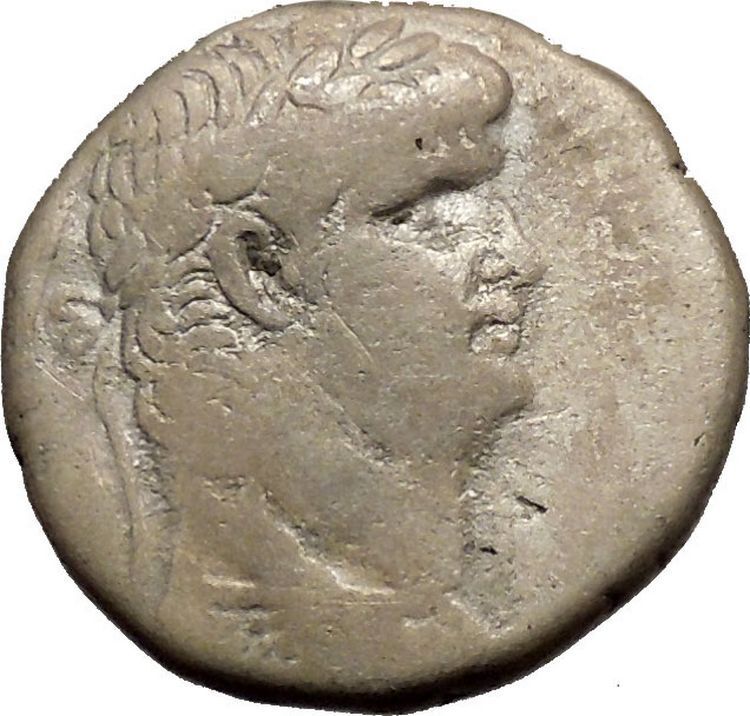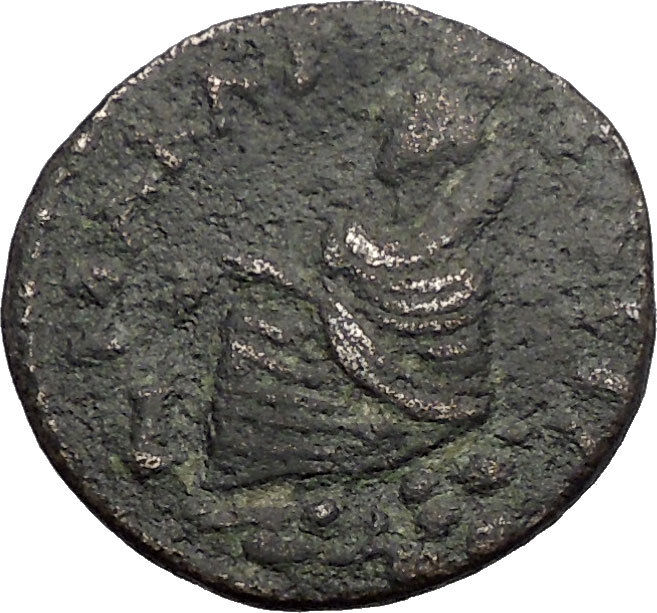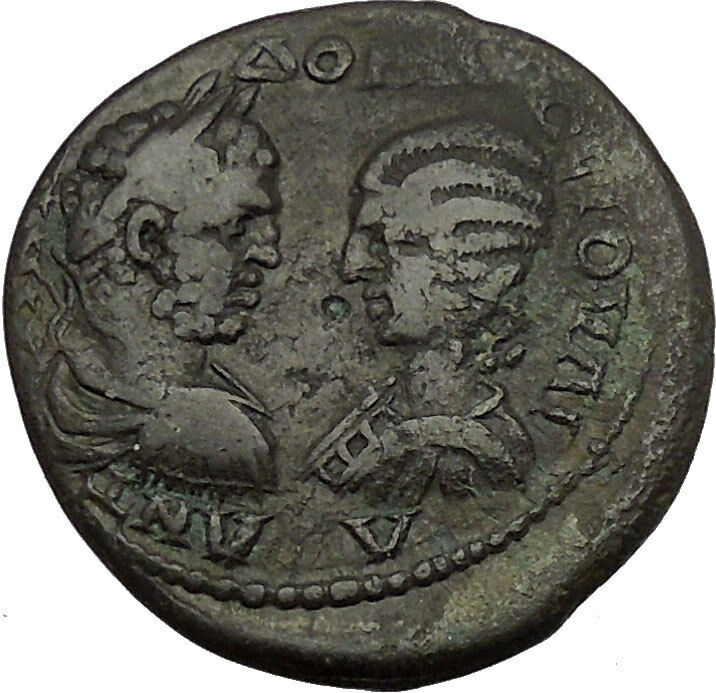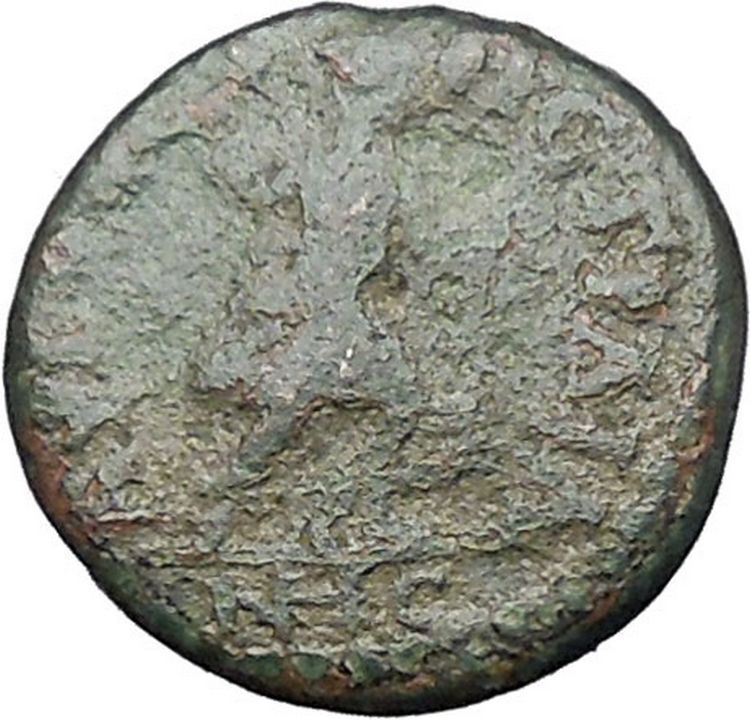|
Septimius Severus – Roman Emperor: 193-211 A.D.
Bronze 25mm (8.66 grams) of Perinthus in Thrace
Certification: NGC Ancients XF 5872305-006
AY K Λ CЄΠ CЄYHPOC ΠЄ, Laureate head of Septimius Severus right.
ΠЄPINΘIΩN, Nude Hermes (Mercury) seated on pile of rocks holding a caduceus.
Perinthos (Perinthus) was an important town in Thrace on the Propontis, was founded by the Samians (island of Samos off Ionia) about 559 B.C. It was situated 22 miles W. of Selymbria on a small peninsula, and was built on the slope of a hill with rows of houses rising above each other like seats in an amphitheatre. It is celebrated for the obstinate resistance which it offered to Philip V of Macedon, at which time it was a more powerful place than Byzantion (Byzantium). Under the Romans it still continued to be a flourishing town, being the point at which most of the roads met leading to Byzantion in Thrace. The commercial importance of the town is attested by its numerous coins which are still extant. At a later time, but not earlier than the 4th century of the Christian era, we find it called Heraclea, which occurs sometimes alone without any addition and sometimes in the form of Heraclea Thraciae or Heraclea Perinthus.
You are bidding on the exact item pictured, provided with a Certificate of Authenticity and Lifetime Guarantee of Authenticity.
 Hermes is the great messenger of the gods in Greek mythology and additionally as a guide to the Underworld. Hermes was born on Mount Cyllene in Arcadia. An Olympian god, he is also the patron of boundaries and of the travelers who cross them, of shepherds and cowherds, of the cunning of thieves and liars, of orators and wit, of literature and poets, of athletics and sports, of weights and measures, of invention, and of commerce in general. His symbols include the tortoise, the rooster, the winged sandals, the winged hat, and the caduceus (given to him by Apollo in exchange for the lyre). Hermes is the great messenger of the gods in Greek mythology and additionally as a guide to the Underworld. Hermes was born on Mount Cyllene in Arcadia. An Olympian god, he is also the patron of boundaries and of the travelers who cross them, of shepherds and cowherds, of the cunning of thieves and liars, of orators and wit, of literature and poets, of athletics and sports, of weights and measures, of invention, and of commerce in general. His symbols include the tortoise, the rooster, the winged sandals, the winged hat, and the caduceus (given to him by Apollo in exchange for the lyre).
Symbols of Hermes were the palm tree, turtle, rooster, goat, the number four, several kinds of fish, incense. Sacrifices involved honey, cakes, pigs, goats, and lambs.
In the Roman adaptation of the Greek religion (see interpretatio romana), Hermes was identified with the Roman god Mercury, who, though inherited from the Etruscans, developed many similar characteristics, such as being the patron of commerce.
The Homeric hymn to Hermes invokes him as the one “of many shifts (polytropos), blandly cunning, a robber, a cattle driver, a bringer of dreams, a watcher by night, a thief at the gates, one who was soon to show forth wonderful deeds among the deathless gods.”
He protects and takes care of all the travelers, miscreants, harlots, old crones and thieves that pray to him or cross his path. He is athletic and is always looking out for runners, or any athletes with injuries who need his help.
Hermes is a messenger from the gods to humans, sharing this role with Iris. An interpreter who bridges the boundaries with strangers is a hermeneus. Hermes gives us our word “hermeneutics”, the study and theory of interpretation. In Greek a lucky find was a hermaion. Hermes delivered messages from Olympus to the mortal world. He wears shoes with wings on them and uses them to fly freely between the mortal and immortal world. Hermes was the second youngest of the Olympian gods, being born before Dionysus.
Hermes, as an inventor of fire, is a parallel of the Titan, Prometheus. In addition to the lyre, Hermes was believed to have invented many types of racing and the sports of wrestling and boxing, and therefore was a patron of athletes.
According to prominent folklorist Yeleazar Meletinsky, Hermes is a deified trickster. Hermes also served as a psychopomp, or an escort for the dead to help them find their way to the afterlife (the Underworld in the Greek myths). In many Greek myths, Hermes was depicted as the only god besides Hades, Persephone, Hecate, and Thanatos who could enter and leave the Underworld without hindrance.
Hermes often helped travelers have a safe and easy journey. Many Greeks would sacrifice to Hermes before any trip.
In the fully-developed Olympian pantheon, Hermes was the son of Zeus and the Pleiade Maia, a daughter of the Titan Atlas. Hermes’ symbols were the cock and the tortoise, and he can be recognized by his purse or pouch, winged sandals, winged cap, and the herald’s staff, the kerykeion. The night he was born he slipped away from Maia and stole his elder brother Apollo’s cattle.
 Septimius Severus – Roman Emperor: 193-211 A.D. Septimius Severus – Roman Emperor: 193-211 A.D.
Augustus: 193-211 A.D. | 193-198 A.D. Sole reign; 195-198 A.D. Caracalla as Caesar | 198-209 A.D. with Caracalla; Geta as Caesar | 209-211 A.D. with Caracalla and Geta
Husband of Julia Domna | Father of Caracalla and Geta | Uncle of Julia Soaemias and Julia Mamaea | Great-uncle of Elagabalus and Severus Alexander | Brother-in-law of Julia Maesa | Father-in-law of Plautilla |
Lucius Septimius Severus (or rarely Severus I) (April 11, 145/146-February 4, 211) was a Roman general, and Roman Emperor from April 14, 193 to 211. He was born in what is now the Berber part of Rome’s historic Africa Province.
Septimius Severus was born and raised at Leptis Magna (modern Berber, southeast of Carthage, modern Tunisia). Severus came from a wealthy, distinguished family of equestrian rank. Severus was of Italian Roman ancestry on his mother’s side and of Punic or Libyan-Punic ancestry on his father’s. Little is known of his father, Publius Septimius Geta, who held no major political status but had two cousins who served as consuls under emperor Antoninus Pius. His mother, Fulvia Pia’s family moved from Italy to North Africa and was of the Fulvius gens, an ancient and politically influential clan, which was originally of plebeian status. His siblings were a younger Publius Septimius Geta and Septimia Octavilla. Severus’s maternal cousin was Praetorian Guard and consul Gaius Fulvius Plautianus.
In 172, Severus was made a Senator by the then emperor Marcus Aurelius. In 187 he married secondly Julia Domna. In 190 Severus became consul, and in the following year received from the emperor Commodus (successor to Marcus Aurelius) the command of the legions in Pannonia.
On the murder of Pertinax by the troops in 193, they proclaimed Severus Emperor at Carnuntum, whereupon he hurried to Italy. The former emperor, Didius Julianus, was condemned to death by the Senate and killed, and Severus took possession of Rome without opposition.
The legions of Syria, however, had proclaimed Pescennius Niger emperor. At the same time, Severus felt it was reasonable to offer Clodius Albinus, the powerful governor of Britannia who had probably supported Didius against him, the rank of Caesar, which implied some claim to succession. With his rearguard safe, he moved to the East and crushed Niger’s forces at the Battle of Issus. The following year was devoted to suppressing Mesopotamia and other Parthian vassals who had backed Niger. When afterwards Severus declared openly his son Caracalla as successor, Albinus was hailed emperor by his troops and moved to Gallia. Severus, after a short stay in Rome, moved northwards to meet him. On February 19, 197, in the Battle of Lugdunum, with an army of 100,000 men, mostly composed of Illyrian, Moesian and Dacian legions, Severus defeated and killed Clodius Albinus, securing his full control over the Empire.
Emperor
Severus was at heart a soldier, and sought glory through military exploits. In 197 he waged a brief and successful war against the Parthian Empire in retaliation for the support given to Pescennius Niger. The Parthian capital Ctesiphon was sacked by the legions, and the northern half of Mesopotamia was restored to Rome.
His relations with the Roman Senate were never good. He was unpopular with them from the outset, having seized power with the help of the military, and he returned the sentiment. Severus ordered the execution of dozens of Senators on charges of corruption and conspiracy against him, replacing them with his own favorites.
He also disbanded the Praetorian Guard and replaced it with one of his own, made up of 50,000 loyal soldiers mainly camped at Albanum, near Rome (also probably to grant the emperor a kind of centralized reserve). During his reign the number of legions was also increased from 25/30 to 33. He also increased the number of auxiliary corps (numerii), many of these troops coming from the Eastern borders. Additionally the annual wage for a soldier was raised from 300 to 500 denarii.
Although his actions turned Rome into a military dictatorship, he was popular with the citizens of Rome, having stamped out the rampant corruption of Commodus’s reign. When he returned from his victory over the Parthians, he erected the Arch of Septimius Severus in Rome.
According to Cassius Dio, however, after 197 Severus fell heavily under the influence of his Praetorian Prefect, Gaius Fulvius Plautianus, who came to have almost total control of most branches of the imperial administration. Plautianus’s daughter, Fulvia Plautilla, was married to Severus’s son, Caracalla. Plautianus’s excessive power came to an end in 205, when he was denounced by the Emperor’s dying brother and killed. The two following praefecti, including the jurist Aemilius Papinianus, received however even larger powers.
Campaigns in Caledonia (Scotland)
Starting from 208 Severus undertook a number of military actions in Roman Britain, reconstructing Hadrian’s Wall and campaigning in Scotland.
He reached the area of the Moray Firth in his last campaign in Caledonia, as was called Scotland by the Romans.. In 210 obtained a peace with the Picts that lasted practically until the final withdrawal of the Roman legions from Britain, before falling severely ill in Eboracum (York).
Death
He is famously said to have given the advice to his sons: “Be harmonious, enrich the soldiers, and scorn all other men” before he died at Eboracum on February 4, 211. Upon his death in 211, Severus was deified by the Senate and succeeded by his sons, Caracalla and Geta, who were advised by his wife Julia Domna. The stability Severus provided the Empire was soon gone under their reign.
Accomplishments and Record
Though his military expenditure was costly to the empire, Severus was the strong, able ruler that Rome needed at the time. He began a tradition of effective emperors elevated solely by the military. His policy of an expanded and better-rewarded army was criticized by his contemporary Dio Cassius and Herodianus: in particular, they pointed out the increasing burden (in the form of taxes and services) the civilian population had to bear to maintain the new army.
Severus was also distinguished for his buildings. Apart from the triumphal arch in the Roman Forum carrying his full name, he also built the Septizodium in Rome and enriched greatly his native city of Leptis Magna (including another triumphal arch on the occasion of his visit of 203).
Severus and Christianity
Christians were persecuted during the reign of Septimus Severus. Severus allowed the enforcement of policies already long-established, which meant that Roman authorities did not intentionally seek out Christians, but when people were accused of being Christians they could either curse Jesus and make an offering to Roman gods, or be executed. Furthermore, wishing to strengthen the peace by encouraging religious harmony through syncretism, Severus tried to limit the spread of the two quarrelsome groups who refused to yield to syncretism by outlawing conversion to Christianity or Judaism. Individual officials availed themselves of the laws to proceed with rigor against the Christians. Naturally the emperor, with his strict conception of law, did not hinder such partial persecution, which took place in Egypt and the Thebaid, as well as in Africa proconsularis and the East. Christian martyrs were numerous in Alexandria (cf. Clement of Alexandria, Stromata, ii. 20; Eusebius, Church History, V., xxvi., VI., i.). No less severe were the persecutions in Africa, which seem to have begun in 197 or 198 (cf. Tertullian’s Ad martyres), and included the Christians known in the Roman martyrology as the martyrs of Madaura. Probably in 202 or 203 Felicitas and Perpetua suffered for their faith. Persecution again raged for a short time under the proconsul Scapula in 211, especially in Numidia and Mauritania. Later accounts of a Gallic persecution, especially at Lyon, are legendary. In general it may thus be said that the position of the Christians under Septimius Severus was the same as under the Antonines; but the law of this Emperor at least shows clearly that the rescript of Trajan had failed to execute its purpose.
|









 Hermes is the great messenger of the gods in Greek mythology and additionally as a guide to the Underworld. Hermes was born on Mount Cyllene in Arcadia. An Olympian god, he is also the patron of boundaries and of the travelers who cross them, of shepherds and cowherds, of the cunning of thieves and liars, of orators and wit, of literature and poets, of athletics and sports, of weights and measures, of invention, and of commerce in general. His symbols include the tortoise, the rooster, the winged sandals, the winged hat, and the caduceus (given to him by Apollo in exchange for the lyre).
Hermes is the great messenger of the gods in Greek mythology and additionally as a guide to the Underworld. Hermes was born on Mount Cyllene in Arcadia. An Olympian god, he is also the patron of boundaries and of the travelers who cross them, of shepherds and cowherds, of the cunning of thieves and liars, of orators and wit, of literature and poets, of athletics and sports, of weights and measures, of invention, and of commerce in general. His symbols include the tortoise, the rooster, the winged sandals, the winged hat, and the caduceus (given to him by Apollo in exchange for the lyre). Septimius Severus – Roman Emperor: 193-211 A.D.
Septimius Severus – Roman Emperor: 193-211 A.D.




